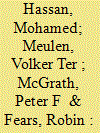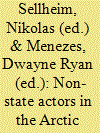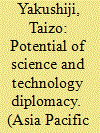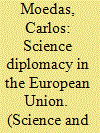| Srl | Item |
| 1 |
ID:
138536


|
|
|
|
|
| Summary/Abstract |
Academies of science are typically independent organizations that commit to the role of advancing science and evidence in policy making. By definition, they are merit based, with members selected from among the leading scientific minds within a country or region. As such, they are viewed at home and abroad as places where scientific excellence across disciplines is represented.
|
|
|
|
|
|
|
|
|
|
|
|
|
|
|
|
| 2 |
ID:
151834


|
|
|
|
|
| Summary/Abstract |
The S&T community not only has the potential to play a significant role in addressing global problems, but they can also be the change agent that strengthens the policy-science nexus at the global level of governance.
|
|
|
|
|
|
|
|
|
|
|
|
|
|
|
|
| 3 |
ID:
154792


|
|
|
|
|
| Summary/Abstract |
What light can foreign policy analysis (FPA) shed on how and when the balance of power between domestic coalitions in foreign nuclear policymaking changes and how these different balances directly affect policy outcomes? Drawing on interviews with scientists, technologists and career diplomats, this comprehensive examination of Argentine nuclear exports policy as public policy aims to depict when and how policies varied between 1976 and 2004, due to shifts in the balance amongst advocacy coalitions, albeit of incentives and constraints placed by international and institutional nuclear environments. The article provides a better account of how Argentine nuclear foreign policy changed under the influence of four competitive and contrasting advocacy coalitions: the pro-import substitution and protectionist coalition, the pro-technological autonomy and South-South trade coalition, the pro-business and commercial openness coalition and the antinuclear and pro-environment coalition.
|
|
|
|
|
|
|
|
|
|
|
|
|
|
|
|
| 4 |
ID:
190127


|
|
|
|
|
| Publication |
Switzerland, Springer, 2022.
|
| Description |
xvi, 326p.hbk
|
| Series |
Springer Polar Sciences
|
| Standard Number |
9783031124587
|
|
|
|
|
|
|
|
|
|
|
|
Copies: C:1/I:0,R:1,Q:0
Circulation
| Accession# | Call# | Current Location | Status | Policy | Location |
| 060351 | 355.0335/SEL 060351 | Main | On Shelf | Reference books | |
|
|
|
|
| 5 |
ID:
089483


|
|
|
|
|
| Publication |
2009.
|
| Summary/Abstract |
Science and technology diplomacy is an emerging concept in Japan's "soft-power" approach to international affairs. This article describes the characteristics and starting points of this new diplomacy and discusses future issues and prospects for Japan's continuing efforts to formulate and implement science and technology diplomacy as part of Japan's government policy.
|
|
|
|
|
|
|
|
|
|
|
|
|
|
|
|
| 6 |
ID:
148208


|
|
|
|
|
| Summary/Abstract |
As the executive body of the European Union (EU), the European Commission represents the interests of the EU as a whole through its right of legislative initiative, its executive functions, and its duties of representation regarding the EU’s twenty-eight member states. Under the leadership of President Jean-Claude Juncker, the commission is carving out a new, more political role for itself. At a time of great political uncertainty—exacerbated by the sovereign debt crisis and the sensitive political and humanitarian consequences of nearby conflicts in Ukraine and Syria—the commission must demonstrate clear political leadership in the interests of Europe.
|
|
|
|
|
|
|
|
|
|
|
|
|
|
|
|